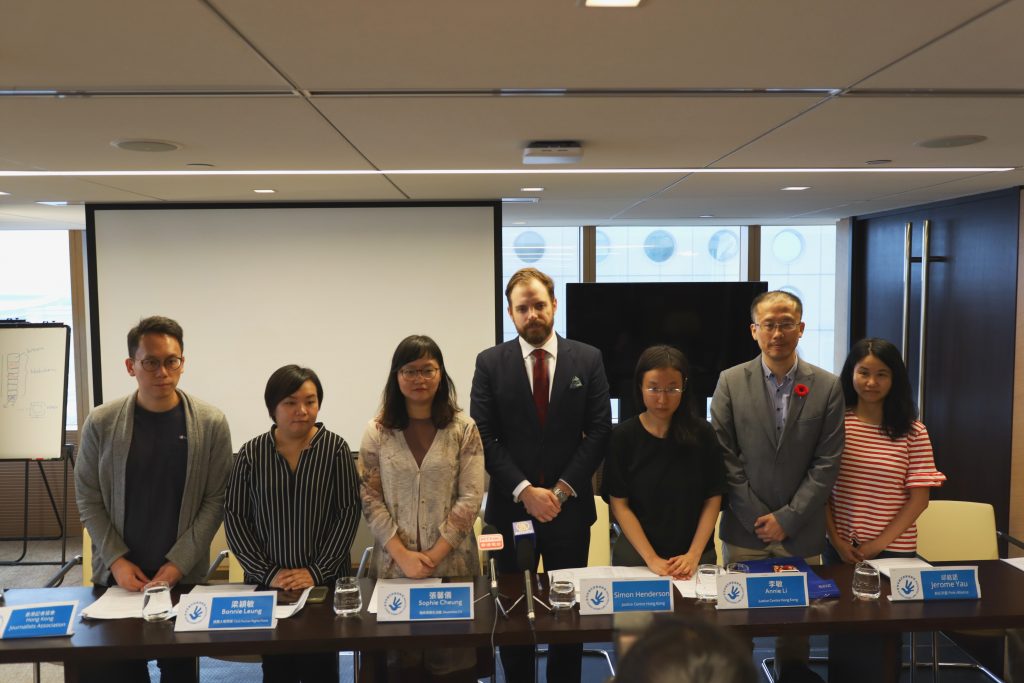A coalition of Hong Kong activists have criticised Beijing after it claimed that it had already implemented recommendations from other countries on Hong Kong’s human rights situation. The activists urged the Hong Kong government to take real action.
Of the 346 recommendations made during the United Nations 2018 Universal Periodic Review (UPR) of China, six of them related to Hong Kong. Of those, China accepted all but Indonesia’s suggestion to ratify the UN’s migrant workers’ rights treaty in the territory.
China accepted a recommendation from Australia to uphold the rule of law and rights embodied in the One Country, Two Systems framework for Hong Kong, whilst another from Canada asked China to ensure the right of Hong Kong people to take part in government, without distinction of any kind. Beijing also accepted a suggestion from France to guarantee freedom of speech, assembly and association.

The UPR is a regular review conducted at the UN every five years. Last Friday, the UN Human Rights Council heard China’s response to comments and suggestions in Geneva, which was attended by Hong Kong Chief Secretary Matthew Cheung.
The Hong Kong UPR Coalition – an alliance of 45 civil society organisations – said that, in accepting the recommendations, the Hong Kong government has made a commitment to address international concerns by implementing changes to law and policy.
But it said China claimed at the UPR process that no changes will be required, since Hong Kong has already implemented the recommendations: “Any suggestion that the recommendations have ‘already been implemented’ is to use the words of Chief Secretary Cheung at the UPR hearing last year, simply ‘unwarranted, unfounded and unsubstantiated,’” said Simon Henderson, spokesperson for the Hong Kong UPR Coalition and senior policy advisor at NGO Justice Centre Hong Kong.
“Foreign governments would not have made the recommendations otherwise. Let alone, would civil society have advocated for so hard and so long if human rights concerns were just a misunderstanding,” he added.
BREAKING: We are delighted to see that #China has accepted 5 out of the 6 #UPR recommendations on #humanrights in #HongKong.
However, we are disappointed that China didn’t accept Indonesia’s recommendation on ratifying the migrant workers rights treaty #ChinaUPR #HKUPR pic.twitter.com/ZUeIc4M3T8
— HongKongUPR (@HongKongUPR) March 5, 2019
The coalition said the Hong Kong government should establish new measures to ensure the recommendations are being implemented.
“Acceptance of the recommendations is positive, but the next step for the government is to take necessary actions to meaningfully ‘connect’ with civil society and implement the Coalition’s proposed measures. Business as usual will not work,” Henderson said.
“The declining human rights environment has clearly harmed Hong Kong’s international reputation. The government’s response to the UPR outcomes provides an opportunity to change course and show that they are truly committed to protecting core values,” he added.
The measures included setting up a cross-sector advisory group to monitor and implement the recommendations; developing a separate institutional mechanism for the UPR process; reforming the consultation processes by providing the draft report to civil groups in advance, increasing the consultations’ range, and increasing access to persons with a disability, among others.

The Coalition also expressed concerns over the decision not to accept the recommendation from Indonesia. It said China had previously accepted similar recommendations.
“The decision not to accept Indonesia’s recommendation can be attributed to the Hong Kong government. This outcome questions commitments to instituting reforms which would help protect and promote the rights of migrant domestic workers,” Henderson said.
